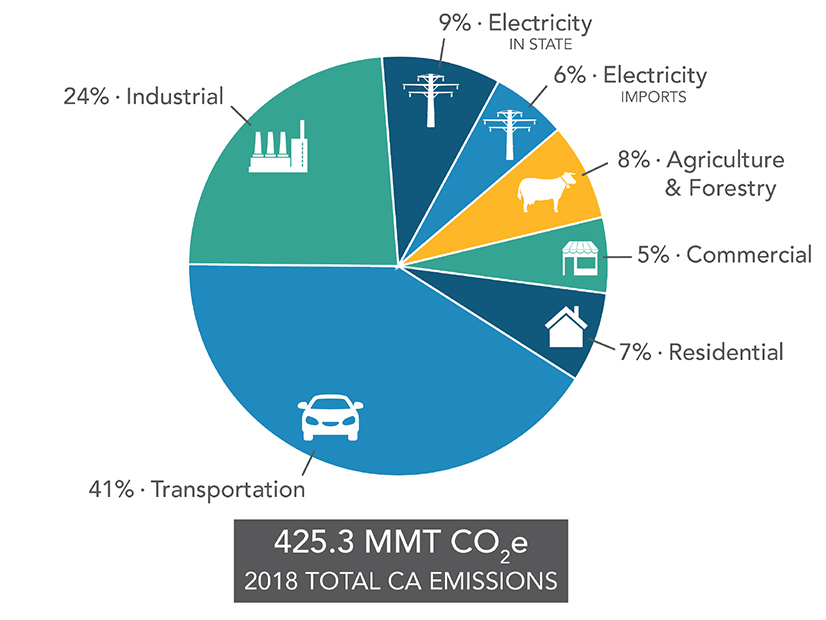The California Air Resources Board (CARB) has started work on a scoping plan that will serve as a roadmap for the state to reach net-zero greenhouse gas emissions by 2045.
And though it’s just the beginning of what’s expected to be an 18-month process to develop the plan, some board members voiced strong opinions last week during a meeting on what areas deserve emphasis.
For board member Hector De La Torre, transportation, natural and working lands, and short-lived climate pollutants should be the primary areas of focus if the state wants to meet an interim target of reducing GHG emissions to 40% below 1990 levels by 2030. The short-lived pollutants include methane, hydrofluorocarbons and black carbon.
Those sectors did not deliver GHG reductions during the past decade, De La Torre said during a CARB board meeting on Thursday.
“Those three have to step up,” De La Torre said. “If we’re going to do this, and I believe we are, then we need to have all of these sectors deliver GHG reductions in the next nine years.”
Board member Daniel Sperling pointed to transportation electrification as a way to reduce air pollution and improve public health. The transportation sector accounts for more than 40% of the state’s emissions, according to CARB data.
In addition, Sperling said, CARB has jurisdiction over transportation electrification.
“This is within our wheelhouse, and it’s the most important thing we’re going to do as part of this scoping plan,” said Sperling, who is a founding director of the Institute of Transportation Studies at the University of California, Davis.
During last week’s meeting, board members heard a presentation on the scoping plan process. Although several board members made comments, the board took no formal action.
Scoping Plan Update
The scoping plan is an outgrowth of Assembly Bill 32, also known as the Global Warming Solutions Act of 2006.
AB 32 requires CARB to develop a scoping plan that lays out a strategy for California to meet its GHG reduction goals. The plan must be updated at least once every five years.
The initial scoping plan was approved in 2008 with updates in 2014 and 2017. The next version of the plan is expected to go to the CARB board for approval in late 2022, following release of a draft plan in the spring.
With an eye toward carbon neutrality by 2045, the 2022 scoping plan will have the longest planning horizon of any scoping plan to date.
Environmental Justice Issues
As part of the process to develop a scoping plan, AB 32 requires CARB to convene an environmental justice advisory committee (EJAC) that includes representatives of communities with high levels of air pollution, including minority and low-income communities.
Several speakers during Thursday’s board meeting criticized CARB for relegating to an appendix the EJAC’s nearly 200 recommendations for the 2017 scoping plan.
EJAC member Paulina Torres asked the board to direct CARB staff to review and analyze the EJAC recommendations from the 2017 plan. That way, the previous recommendations can be used as a foundation for the current EJAC’s work, she said.
“It’s one way to signal that EJAC recommendations won’t just be appendicized somewhere, but that staff is really prioritizing and taking these measures seriously and conducting the necessary, detailed analysis,” said Torres, who is a staff attorney for the Center on Race, Poverty & the Environment.
Another issue for Torres is pesticides and their contribution to GHG emissions. Torres said that CARB should consult with the California Department of Pesticide Regulation in developing the scoping plan.
EJAC member Sharifa Taylor called for better integration of the committee’s work into the body of the scoping plan, rather than listing recommendations in an appendix.
Taylor also cautioned against focusing on the 2045 net-zero goal at the expense of the interim 2030 goal of reducing GHG emissions to 40% below 1990 levels.
“We’re getting to a point where our climate impacts are becoming accelerated and potentially unstoppable,” she said.




